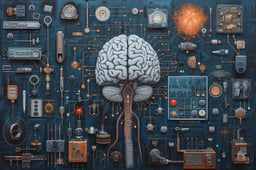Track
Move over, data science! There’s a new kid on the block shaking things up in the data industry - the machine learning engineer.
This role has witnessed tremendous growth in the past few years, surpassing even data science to become one of the fastest-growing jobs in the US. The salary of a machine learning engineer is also on par with, and in some cases, even higher than that of a data scientist.
In this article, we will dive into the job scope of a machine learning engineer and learn exactly what the role entails. Then, we will take you through the skills necessary to become a machine learning engineer, diving into the specific knowledge areas you’ll need to master. Finally, we’ll explore effective learning paths to help you acquire these skills and become a job-ready machine learning engineer.
What is a Machine Learning Engineer?
In simple terms, machine learning engineers sit at the intersection of data science and software engineering.
Let’s look at an example to better understand this:
An e-commerce company hires a data science team to build predictive models. The team successfully builds an algorithm to provide users with recommendations based on their purchase history.
However, they are unable to integrate this model onto the e-commerce website and actually display the recommended items to the customer, leading to a bad user experience:

Image by DALLE-3
This bottleneck occurs because although the team excels at performing statistical analysis and building highly accurate machine learning models, they struggle to productionize these algorithms due to a lack of software engineering expertise.
The company ends up having to outsource this task to a third-party organization, spending more time and money than they initially expected to invest in the project.
This discrepancy between model development and implementation has led to the birth of the machine learning engineer - a professional who possesses the combined skillset of a data scientist and a software engineer.
Technical Machine Learning Engineer Skills
We’ve got a full article on how to become a machine learning engineer, which explores pathways into the industry. Here, we’re focusing more on the skills you’ll need and how to acquire them.
Since machine learning engineering sits at the crossroads of data science and software engineering, you must be well-versed with core concepts in both domains:
Data Science Skills for ML Engineering
1. Statistical Analysis and Probability
A foundational understanding of statistics is necessary if you want to become a machine learning engineer, as it allows you to interpret data and extract relevant insights. This involves knowledge of statistical tests, distributions, and probability theories.
Once you build a strong understanding of statistical concepts, you will be able to design accurate models and make predictions based on data analysis.
Although these concepts might sound foreign to you, they aren’t all that difficult to learn! Datacamp’s Introduction to Statistics course will give you a strong foundation in the subject, teaching you topics like probability distributions and hypothesis testing.
By the end of this course, you will be able to collect, analyze, and draw conclusions from real-world datasets.
2. Machine Learning
You also must be well-versed in building highly accurate machine learning models, such as decision trees, clustering, and regression algorithms.
This is a core skill set of a data scientist that you must master so that the models you build are theoretically sound and provide consumers with a great user experience.
To properly understand and implement the algorithms outlined above, you can take our Machine Learning Fundamentals learning track. If you are a complete beginner to the field and need a refresher on what machine learning actually entails, read our comprehensive overview of the field, where we outline its significance, applications, and how you can get started.
3. Model Evaluation
After building a machine learning model, you must evaluate its performance to ensure its effectiveness and reliability. This involves utilizing appropriate metrics like accuracy, precision, and recall to assess if the model is on par with expectations.
As a machine learning engineer, you need to go a step further and monitor model performance in the real world.
Once you deploy an algorithm, you must regularly evaluate it to ensure that it adapts to changes as new data starts entering the system. An oversight at this stage can lead to a failed machine learning project.
Here is a real-world case study showcasing the importance of consistent model evaluation:

Image by DALLE-3
After just three months of building a machine learning model to predict readmissions at multiple hospitals, this CTO discovered that the system was making inaccurate predictions. This is because the data entering the system had shifted, breaking the features the model depended on. It is imperative to capture and fix issues like this at an early stage through continuous monitoring and model evaluation.
You can learn more about how to evaluate machine learning models in our Model Validation in Python course.
Software Engineering Skills for ML Engineering
Next up, let’s look at some of the software engineering skills you’ll need:
4. DevOps and CI/CD
To deploy machine learning models and continuously monitor their performance over time, you need to learn DevOps, a combination of software development and IT operations.
In simple terms, this is a set of practices that allows you to reduce the amount of time it takes to develop software while also ensuring that the end product is of high quality.
Two key practices in DevOps include Continuous Integration (CI) and Continuous Deployment (CD). CI allows you to test changes in code automatically to fix errors quickly. Subsequently, CD automates the deployment of code changes to production after testing.
Take our Introduction to DevOps course to learn more about DevOps and CI/CD pipelines.
5. Cloud platforms
Cloud platforms like AWS, Azure, and Google Cloud Platform provide services specifically designed to build, train, and deploy machine learning models.
AWS, for instance, provides Sagemaker to facilitate high-quality, low-cost machine learning algorithms. Other services, such as CodeBuild, also help automate the CI/CD process, taking hours of grunt work off your hands.
Companies are increasingly adopting cloud platforms for their AI and machine learning initiatives, making familiarity with them highly valuable.
Since they are in such high demand, we recommend learning these platforms to improve your career prospects as a machine learning engineer.
To get started with cloud computing, you can take Datacamp’s AWS Cloud Concepts course.
6. Version control
After deploying machine-learning models in real-world applications, you will end up having to update the data used to train these algorithms or create different model versions as time goes by.
Version control is a system that records these changes over time, allowing you to track revisions and revert to previous versions if needed.
This allows you to pinpoint exactly who changed what and when. It also facilitates seamless collaboration, and lets you try new ideas without the fear of losing the original code.
Git is the most widely used tool for version control, as it helps you keep track of your source code history. You can take our Introduction to Git course if you’d like to learn more about version control.
Machine Learning Engineer Skills - Programming Languages
Of course, it’s no surprise that to become a machine learning engineer, you must know how to code.
Most machine learning engineer job listings expect proficiency in at least one programming language like Python, Java, or C++. There is a strong emphasis on knowledge of Object-Oriented Programming (OOP).
This is because OOP is a programming paradigm that helps structure your code and make it more manageable, simplifying the development of complex machine learning tasks.
Each language offers unique benefits:
7. Python
Python is a popular choice for machine learning engineering because of its simplicity, along with an extensive choice of libraries like Tensorflow and Pytorch.
Since the language is so widely used in different tech fields, such as data analytics and web development, knowledge of Python is transferable and opens doors to various other roles. Our Python Fundamentals track is the ideal place to master the basics of data analysis with Python.
8. Java
Although not as popular as Python, Java is also widely used in industry and is known for its robustness.
Due to its ability to handle large-scale, distributed systems efficiently, it is an ideal choice for deploying machine learning models in production environments.
Furthermore, some organizations may require you to work with big data technologies like Apache Spark and Hadoop, both of which are written in Java. Knowledge of Java can provide a more seamless experience when working with these platforms.
9. C++
C++ is often more efficient than both Python and Java, making it an ideal language for scenarios in which computational performance is vital.
When performing resource intensive tasks such as training deep learning models, for instance, C++ can significantly reduce the training time and improve model performance.
Furthermore, popular machine learning frameworks like Tensorflow and Pytorch are written in C++, and the language allows for more control over model implementation and optimization.
If you only have the time to learn one programming language, we’d recommend learning Python since it is in high demand, easy to use, and versatile.
It also offers a wide range of machine learning libraries that aren’t readily available in Java and C++. Furthermore, once you learn to code in one language, the skills you gain are transferable to other programming languages, allowing you to easily adapt and learn new technologies as you progress.
Soft Skills for Machine Learning Engineers
Employers are increasingly looking for candidates with the technical know-how and soft skills that make them easy to work with. Some soft skills that you must have as a machine learning engineer include:
10. Communication
As a machine learning engineer, you must gather requirements and present findings to key stakeholders to ensure that the end product aligns with the business objective.
This means that you must be good at getting your point across. Since non-technical stakeholders often don’t understand technical jargon, it’s essential to translate complex machine learning concepts into understandable terms.
If you want to improve your data presentation and communication skills, you can take our Data Communication Concepts course.
11. Problem-solving
As a machine learning engineer, you will frequently run into issues when building, testing, and deploying models. An example of this can be seen earlier in the article when a system that had been meticulously created and tested had begun to degrade due to changes in real-world data.
When faced with problems like this, it’s crucial to work with your team to analyze the situation, identify possible causes, and systematically test solutions.
12. Continuous learning
The tech industry is always changing, and new frameworks and programming languages are frequently being introduced.
As a machine learning engineer, it is important that you don’t get too focused on a single tech stack, and be open to experimenting with new frameworks as they are released. Flexibility and continuous learning are key to staying on top of your field.
Final Thoughts
To summarize, machine learning engineering is a fast-growing career that addresses a significant skill gap between data science and software engineering.
If you want to get a job in this field, you must possess knowledge of data science, software engineering, and at least one programming language. Furthermore, soft skills like effective communication and problem-solving will improve your chances of getting hired and promoted in the field.
Finally, remember to continuously evolve with the tech landscape, stay updated with the latest trends, and build a versatile skill set.
If you’re ready to start your journey towards becoming a machine learning engineer, check out our Machine Learning Engineer skill track, which is designed for aspiring professionals.

Natassha is a data consultant who works at the intersection of data science and marketing. She believes that data, when used wisely, can inspire tremendous growth for individuals and organizations. As a self-taught data professional, Natassha loves writing articles that help other data science aspirants break into the industry. Her articles on her personal blog, as well as external publications garner an average of 200K monthly views.





